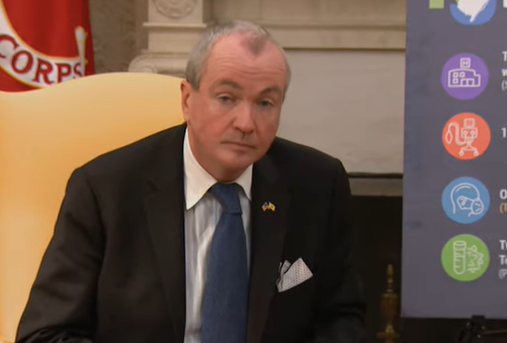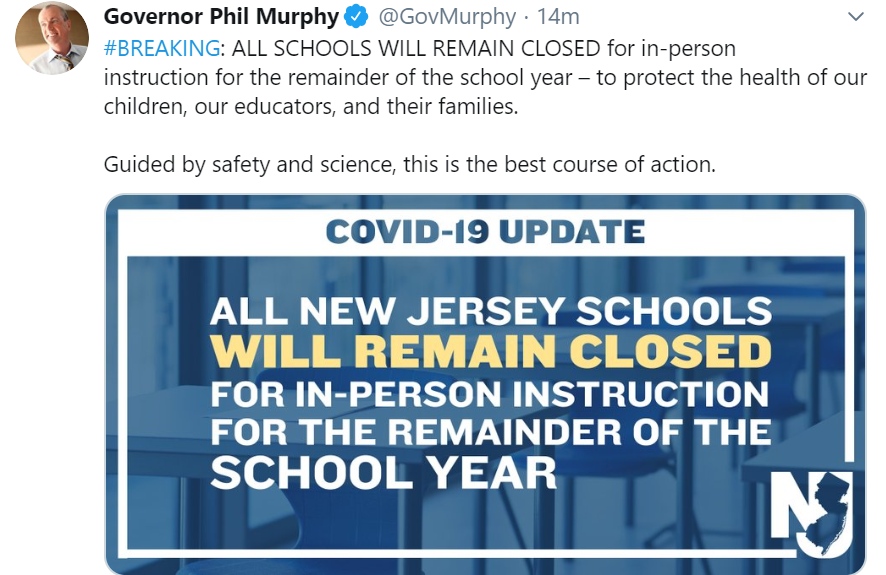Murphy: Schools to Remain Closed for the Rest of the School Year

Governor Phil Murphy this afternoon announced that ALL SCHOOLS WILL REMAIN CLOSED for in-person instruction for the remainder of the school year – “to protect the health of our children, our educators, and their families.”
In a tweet moments ago, Murphy said his decision was “guided by safety and science, this is the best course of action.”
In a few minutes, the governor is expected to speak more in-depth about the school year at his daily press briefing from the War Memorial in Trenton.
UPDATE:
Murphy at his press briefing said the following:
“All New Jersey school buildings will remain closed for the 2019-2020 school year,” the governor said. “All students will continue with remote learning. We reached this decision after much consideration, including both educators and parents.
“The reality is we cannot safely open our schools,” Murphy added.
The hurdles could simply not be ovecome.
Moments later, Murphy reported an additional 1,621 COVID-19 positive cases, for a statewide total of 128,269. Forty-five more people died, for a total of 7,910.
“This number is likely lower owing to a network outage yesterday,” Murphy said.
The governor made his announcement regarding the schools on the heels of New York Governor Andrew Cuomo drawing the same conclusion about the school year.
From the State of New York:
Amid the ongoing COVID-19 pandemic, Governor Andrew M. Cuomo today announced all K-12 schools and college facilities statewide will remain closed for the rest of the academic year and will continue to provide distance learning during that time. The schools will also be required to continue meal programs and child care services for essential workers. The state will make a decision about summer school programming by the end of May.
Governor Cuomo is also directing all schools and colleges to create re-opening plans that re-imagine school facilities in light of the COVID-19 pandemic. These plans should consider how schools can monitor the spread of COVID-19; how to reinforce student safety; when and how to resume extracurricular activities; protocols for special student populations; steps to ensure student mental health; alternative academic calendars; among other considerations. All plans will be reviewed and approved by the state.

FROM THE GOVERNOR’S OFFICE:
Citing the need to protect the health of New Jersey’s 1.6 million public and private school students as well as thousands of educators and support staff, Governor Phil Murphy today announced that statewide school closures will be extended through the end of the 2019-2020 academic year. Private schools with longer academic years will remain closed until at least June 30.
While the prohibition of in-person instruction will be maintained through the end of the school year, public schools will continue to provide remote learning for students to allow districts to meet the state-required minimum of 180 instruction days.
“This is a difficult decision and I know that many students, parents, and staff would like to be able to return to school,” said Governor Murphy. “However, I have been unwavering on the message that we need to make decisions based on science, not emotion. And while New Jersey is making great strides in mitigating the spread of COVID-19, science tells us that at this point, we can’t safely re-open our schools.”
“I commend Governor Murphy’s thoughtful, deliberative approach that takes into account the concerns of school administrators, teachers, and other stakeholders in the education community,” said Education Commissioner Lamont O. Repollet. “However, the most compelling factor guiding today’s decision is the health of New Jersey’s students and educators, and their families.”
The Administration will create a steering committee consisting of a diverse group of stakeholders in the education community to explore summer learning opportunities for all students, including school-sponsored summer programming and Extended School Year for students with disabilities. The committee will provide recommendations to the Administration as to which services need to continue to be provided remotely should the public health emergency extend past the conclusion of the 2019-2020 school year.
The committee will also explore approaches for the safest and most efficient re-opening of schools for the 2020-2021 school year.
In addition, the Department of Education will work with school officials to share ideas on safe and innovative ways to recognize 2020 high school graduates and other end-of-year milestones for students.
Federal Stimulus Funding
The Administration plans to tap federal funds that will help schools improve continuity of learning, assist with sanitizing and deep cleaning of school buildings, and address the emotional needs of students.
New Jersey recently applied for $310 million in federal funding through the Elementary and Secondary School Emergency Relief Fund, which is part of the Coronavirus Aid, Relief, and Economic Security (CARES) Act.
Districts will have substantial local discretion in use of these funds; the CARES Act lists a number of allowable uses, including:
- Purchase of educational technology, including hardware, software and connectivity
- Purchase of sanitization and cleaning supplies
- Mental health supports
- Plan and implement activities related to summer learning and supplemental after-school programs, including providing online learning during the summer months to address the needs of student subgroups
- Planning and coordinating the distribution of meals to eligible students
- Provide principals and other school leaders with the resources necessary to address the needs of their individual schools
- Activities to address the unique needs of student subgroups
Federal officials have signaled that states can anticipate a rapid approval of applications for this stimulus funding.
Updated Preparedness Plans
In the weeks leading up to Governor Murphy’s order to close schools statewide starting March 18, the Department of Education required school districts to develop Emergency Preparedness Plans that addressed critical issues, such as delivery of remote instruction, special education services, and food security. The Murphy Administration will call on school districts to revise their schoolwide Emergency Preparedness Plans to address the extension of school closures through June 30.








Leave a Reply